I lift the lid of my apartment building’s Biomüll garbage bin, ready to toss in the week’s trash, when suddenly something catches my eye. What’s this? Plastic in the Biomüll? What kind of monster would do this? I ask myself, preparing to plunge my hand into the smelly abyss and rescue the yogurt cup to its proper home in the gelber Sack. But before I can, the realization hits me: four years ago, I wouldn’t have even cared. But here I am, filled with righteous indignation at the sight of improperly sorted garbage, ready to stick my hand in a reeking garbage bin to remedy the situation. I’d be lying if I said the thought of posting a passive-aggressive letter over the bins didn’t flash through my mind. The signs are clear: I’ve been German-ized.
Long before this moment of revelation by the Biomüll, trash sorting was something that rarely came into my mind. I lived in California, where each house had three big trash bins- black for household waste, blue for recycling, green for garden waste. Sure, I considered myself to be “eco-friendly”. But sometimes paper simply ends up in the household waste, and who wants to go all the way outside to scrape the leftover salad into the green bin after dinner?
Even before setting foot in Germany, I realized that things are taken quite a bit more seriously here. I received a warning from some friends who had recently moved to Berlin. Not long after settling into their new apartment, the doorbell rang. A neighbor had noticed a tin can in the general waste and immediately assumed the new arrivals must have been behind it. Now he was at their door, sternly, albeit well-meaningly, lecturing them about the importance of proper Mülltrennung.
Mülltrennung, or “trash sorting” in English, is sometimes jokingly referred to as a German national pastime, and certainly something that they feel strongly about. The system receives international praise for its efficiency. Germany leads the EU in municipal waste recycling, with a rate of 67.3% in 2018. This efficiency, however, comes at the price of complexity, which can be overwhelming for those of us used to only three bins or less. In Germany, there are far more containers involved, and what should be sorted where can vary significantly by region or city.
In Nuremberg, most households and apartment buildings are equipped with three bins: black Restmüll for household waste, green or brown Biomüll for biodegradables, and blue Papier for paper and cardboard. Pretty easy to follow so far, but from here, it gets more complicated. Plastic packaging, tin cans, Tetra Paks, and the like get sorted into the gelber Sack, yellow plastic bags that each household must collect from a nearby distribution point, often at the city hall (Yellow bins are slowly replacing the gelber Sack, so if your housing already has one, you can save yourself a trip to the Rathaus). Glass and plastic bottles with a Pfand (deposit) marking should be returned to the supermarket for a refund. The rest of the glass bottles and jars must be carried to the closest public recycling container and sorted by color (but only during certain hours and never on a Sunday, to avoid annoying nearby residences with the sound of breaking glass!). Batteries and LED light bulbs should stay out of the household waste; most supermarkets are equipped with collection containers for these. For the rest- electronics, CDs, paint, and bulky waste such as furniture- it’s time to pack up the car, drive to the nearest Recyclinghof (also sometimes called Wertstoffhof), and toss the trash into its proper container.
At the beginning, I balked at the German recycling system and dismissed it as yet another set of complex rules in a country that loves rules. Over time, however, I started to understand why it is so complex. The Germans are a passionate people. Perhaps not in the joie de vivre sense that comes to mind when one thinks of France or the Mediterranian, but in the sense that they never face a problem half-heartedly. With the hazards of climate change and pollution becoming ever more apparent, Germans are serious when it comes to implementing practical solutions. The individual responsibility to protect the environment is clear to them- and therefore they are proud to do their part, and encourage others to do their part as well. And, after a few years of living in Germany, I’ve been infected with this passionate enthusiasm too. More than simply putting the right trash in the right bin, I’ll go out of my way to recycle. I’ll carry my plastic trash around in my backpack all day, just so I can sort it at home instead of throwing it into a general bin on the street. Every leaf that falls off a houseplant is lovingly carried to the Biomüll. And yes – every yogurt cup I find improperly sorted, I will move to its proper bin – provided that I don’t need to dig too deep to get it!




Excellent article!
Frau Stentz,
Ich habe Ihren Aufsatz geliebt und bin stolz auf Sie, dass Sie sich um unsere Erde gekümmert haben. R und R Worrall
If only you spent so much time on things that really matter in your life.